| Srl | Item |
| 1 |
ID:
193472
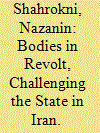

|
|
|
|
|
| Summary/Abstract |
The protests that erupted across Iran in 2022 after the death of a woman arrested for noncompliance with a headscarf requirement were not only about religious dress codes. They were a culmination of years of growing discontent over broader questions involving the place of women in the Islamic Republic and other grievances about the reach of an overbearing state and perceived social and political injustices. The erosion of civil society has made it difficult to sustain the protests’ momentum, as the state moves to co-opt businesses and the public into enforcing its decrees, but the uprising is part of a longer-term, nonlinear process of dissent-driven change in Iran.
|
|
|
|
|
|
|
|
|
|
|
|
|
|
|
|
| 2 |
ID:
113069
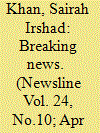

|
|
|
| 3 |
ID:
098228
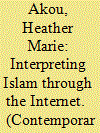

|
|
|
| 4 |
ID:
171870
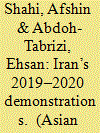

|
|
|
|
|
| Summary/Abstract |
The widespread protests of November 2019 may be marked as the bloodiest recent chapter of the Islamic Republic of Iran's history in terms of popular dissent. The two major protests in December 2017 and November 2019, followed by the public reaction to the shooting down of the Ukrainian International Airlines Flight 752 by the IRGC over Tehran after the US killing of General Soleimani, suggest that the prevailing dynamics of political protest in Iran are changing. There is an increasing sense of radicalisation among protesters, while the state is prepared to resort to extreme violence to maintain control. The geography of political protest has changed. The declining economic situation has had a profound impact on the more vulnerable segments of the society who are now increasingly playing a more proactive role in challenging the state. The methods of protest have been evolving over the last four decades, especially in the cultural arena. Last but not least, the willingness of the protesters both to endure and inflict violence is precipitously transforming state-society relations beyond recognition.
|
|
|
|
|
|
|
|
|
|
|
|
|
|
|
|
| 5 |
ID:
192964
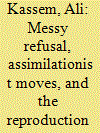

|
|
|
|
|
| Summary/Abstract |
visibly Muslim women in Lebanon, a small country on the eastern shores of the Mediterranean, experience significant anti-Muslim racism. Thinking through their anti-racist work, this article identifies and examines a refusal – a pre-emptive move away from power rather than against it that works to make it obsolete and survive despite it. Analysing this movement away, I argue, reveals it as a movement towards a neoliberal ‘civilized’, ‘cultured’, and consumer subject assimilating into Eurocentric modernity/coloniality while surviving in the materiality of its Muslimness. The article accordingly posits this as a form of ‘messy refusal’ – implicated in the cultural and epistemic reproduction of Eurocentric modernity/coloniality – and complexifies refusal’s growing celebration across anti/post/decolonial and indigenous scholarship. In doing this, it contributes to rethinking anti-Islamophobia from the so-called Middle East rather than Euro-America and examining it as a longer process rather than exclusively focusing on the racist moment and site.
|
|
|
|
|
|
|
|
|
|
|
|
|
|
|
|
| 6 |
ID:
180274
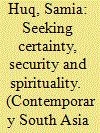

|
|
|
|
|
| Summary/Abstract |
Bangladesh has made significant strides on women’s issues in the areas of education, employment and politics. In the wake of this progress, the country has also experienced a surge of religious ideas leading to secular anxiety that cultural Islamization is leaving very tangible marks on the bodies and lives of women. The proliferation of the hijab along with an appropriation of other religio-cultural elements into everyday life is considered to be an example of the force of Islamization that many fear to be conducive to radicalization. In this paper, I probe the role of religion in the lives of female university students in an attempt to assess what it means for them to be young, to have aspirations, to navigate different and often opposing expectations, and to assert their agency as they stand on the cusp of adulthood. In teasing out the influences that give their lives’ navigations religious sanctions and/or approvals, I trace the place of inclusivity, pluralism and tolerance in the lives of young, educated women in Bangladesh.
|
|
|
|
|
|
|
|
|
|
|
|
|
|
|
|
| 7 |
ID:
105008
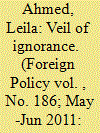

|
|
|
| 8 |
ID:
154718
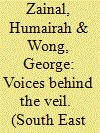

|
|
|
|
|
| Summary/Abstract |
This article critically examines the hijab debate in Singapore by drawing upon the lived experiences of Singaporean Malay-Muslim women whose daily lives are fraught with a constant negotiation between their identities as veiled women and the institutionalized constraints that impede their social mobility and voices in the public arena. Drawing upon publicly accessible data and findings from in-depth interviews with Malay-Muslim nurses, the article explores the everyday lived struggles of women working in Singapore’s public healthcare sector organizations. These struggles illustrate a decade-old public debate on the hijab. We show how these women’s narratives reflect their intersectional subjectivities, which unravel dominant state discourses on multiracialism that claim the incompatibility of the hijab with secularism. We argue that a re-positioning of the existing debate beyond its dominant association with race is crucial in overcoming the political inertia that continues to plague the hijab issue in Singapore.
|
|
|
|
|
|
|
|
|
|
|
|
|
|
|
|